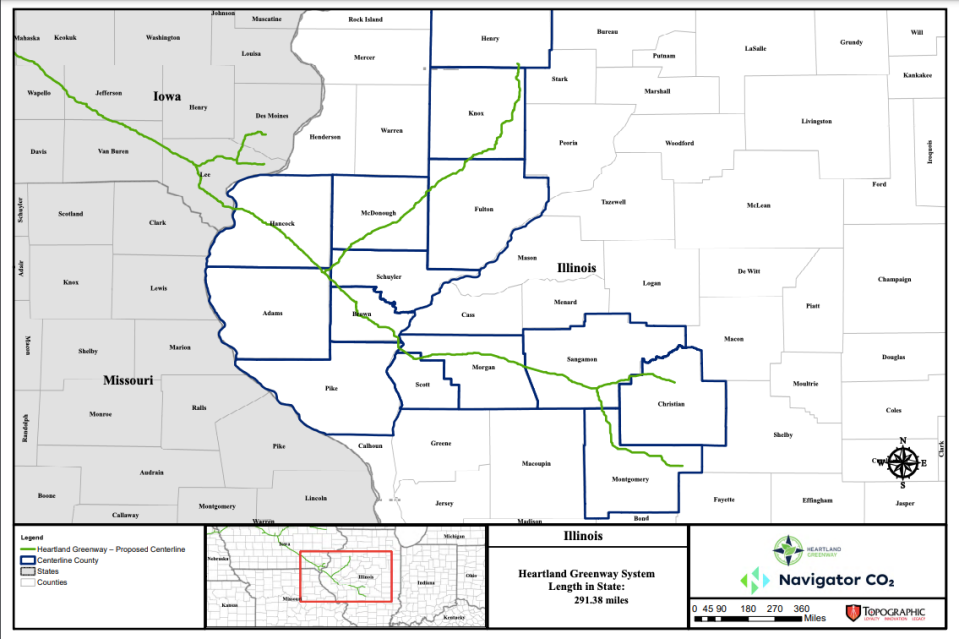Ten days after withdrawing from ICC, Navigator cancels CO2 pipeline
A 1,350-mile carbon dioxide pipeline spanning five Midwestern states, including Illinois, has been formally canceled.
Navigator CO2 Ventures had encountered difficulties in selling its $3.4 billion project, particularly in South Dakota and Iowa, due to public safety concerns about a pipeline burst. Effectively, the project would take CO2 emissions and convert them into a fluid substance before being transported via the pipeline into sequestration sites in Illinois.
Less than two weeks ago, the Nebraska-based company withdrew its application with the Illinois Commerce Commission — the second time it had done so this year.
More: 'Something in me died following the abuse:' Victims of clergy abuse speak out

Navigator said at the time that it had planned to refile with a new route, but those plans appear thwarted. Calls requesting information as to whether the company could pursue a similar project in the future were not returned.
"As good stewards of capital and responsible managers of people, we have made the difficult decision to cancel the Heartland Greenway project," Matt Vining, chief executive of Navigator CO2 said in a statement Friday. “We are disappointed that we will not be able to provide services to our customers and thank them for their continued support.”
The latest route would have covered 292 miles overall and 13 Illinois counties. Sites in either Christian or Montgomery counties would have been underground sequestration areas, storing carbon dioxide produced from 21 ethanol and fertilizer facilities.
In addition to 39 miles running through Sangamon County, other counties included in the pipeline were Adams, Brown, Fulton, Hancock, Henry, Knox, McDonough, Morgan, Pike, Schuyler and Scott.
Pam Richart, co-founder of the Coalition to Stop CO2 Pipelines, said the cancellation underscored Navigator's failure to sell its pipeline to landowners and officials. Internal data showed it had only obtained 13.4% of the easements to construct its pipeline in the state as of June.
“Navigator’s inability to secure enough public support for the pipeline sends a clear message that stronger protections are needed at both the state and federal level," she said.
For Richart and Sierra Club of Illinois communications coordinator Hannah Lee Fath, that means pushing legislation including the Carbon Dioxide Transport and Storage Protections Act listed under Senate Bill 2421 and House Bill 3119.
Environmental advocates pledged their support for the legislation during the spring session, none advancing out of committee. The bills set standards for how far a pipeline must be from a property in addition to requiring a CO2 pipeline company to pay for emergency personnel training in preparation for a potential burst.
Seen as a prime geographic location for carbon capture and storage, the possibility remains for other companies to submit similar plans with ICC. Wolf Carbon Solutions is also moving forward with its pipeline spanning nine counties in the state that would traverse near Peoria and store CO2 at a ADM facility in Decatur.
"This doesn't mean that the fight is over," said Fath.
What environmental advocates see as a victory, business interests view as a lost opportunity.
The Illinois Manufacturers' Association, along with Illinois AFL-CIO, has promoted carbon capture as a potential $3.3 billion boon to the region according to research from the University of Illinois Urbana-Champaign.
A 2020 pipeline burst in Satartia, Mississippi sent more than 40 people to the hospital and the evacuation of 300 prompted safety concerns. Still, Mark Denzler, president and chief executive of the Illinois Manufacturers’ Association, contends the technology is safe.
“Carbon capture and storage is a tremendous economic opportunity that will also result in significant reductions in carbon emissions, especially in the manufacturing sector," he said in a statement.
Both IMA and environmental groups hope the upcoming veto session will include action regarding CO2 pipelines. The six-day session begins on Tuesday and ends in November.
Contact Patrick Keck: 312-549-9340, pkeck@gannett.com, twitter.com/@pkeckreporter.
This article originally appeared on State Journal-Register: Navigator Heartland Greenway pipeline cancelled: What to know.

